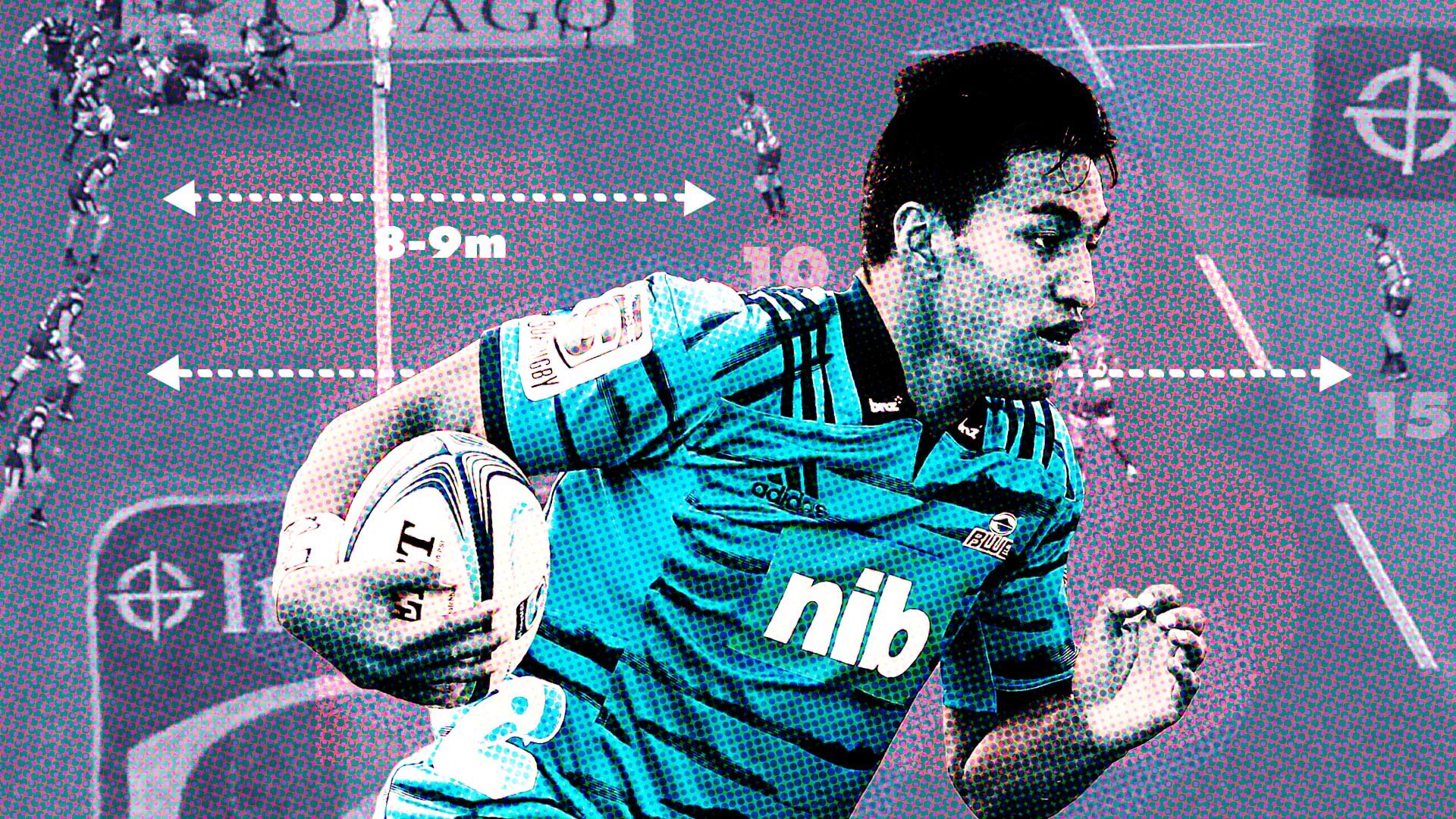Superstar Rieko Ioane put up a decent stat line in the Blues agonising 41-34 defeat against the Highlanders last week– 75 run metres on 12 carries, with five defenders beaten and four clean breaks, showing flashes of his explosive talent.
The stats might look pretty, but in reality, most of this came from counter-attack and generally very little from set-piece and only in specific circumstances in phase play.
When you look into this deeper the Blues are not using Ioane effectively, at least not to his maximum potential, and the Chiefs and every other team are going to thank them for it.
The Blues are going to run into real problems this year based on what we saw last Friday night and run the risk of wasting Ioane’s talent on the wing. Head coach Tana Umaga explained earlier this year his reasoning for leaving Ioane on the wing.
“I said to him it’s hard when he’s the world’s best left wing so it’s his own fault at the moment.
One key difference is missing here – the Blues are not the All Blacks. What Ioane does for the All Blacks on the wing cannot be expected at the Blues. The All Blacks create space for Ioane on the wing, the Blues don’t.
Blues problems run deep
What we learned against the Highlanders is the Blues are trying to play shockingly deep. This structure is going to hamper Ioane’s ability to get quality ball in space all season long during phase play.
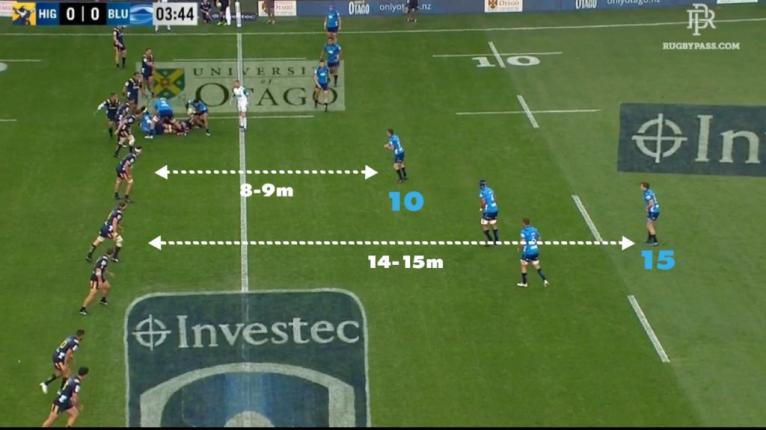
The depth in itself isn’t the problem. The issues develop when the Blues backs remain static and pass directly backward instead of flat and ‘out in front’ of the player. This starts with Gatland at 10 and exacerbates as the play goes on.
The starting depth combined with deeper passing results in huge gain line losses for the Blues.
Here Gatland’s catch’n’pass is almost in the same spot and Collins is not much better. By the time Collins receives the ball, the play is already 13 metres behind the gain line.
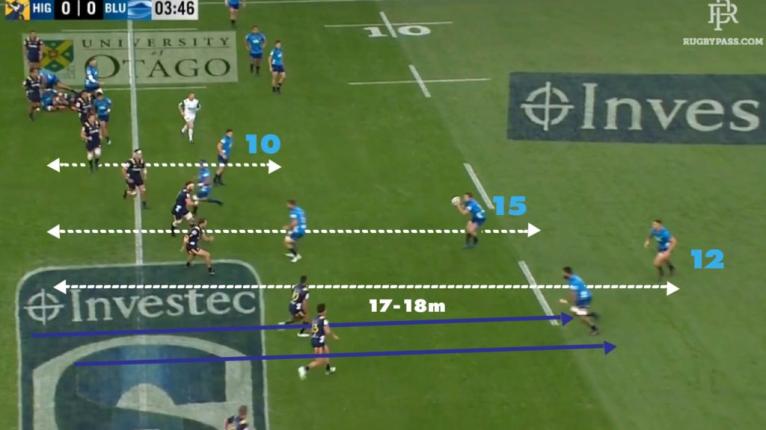
The Highlanders rush defence is able to sprint up as there are really no flat options for the Blues.
By the time Sonny Bill Williams receives the ball, Rob Thompson is in his face and is able to tackle him for a 15-metre loss.
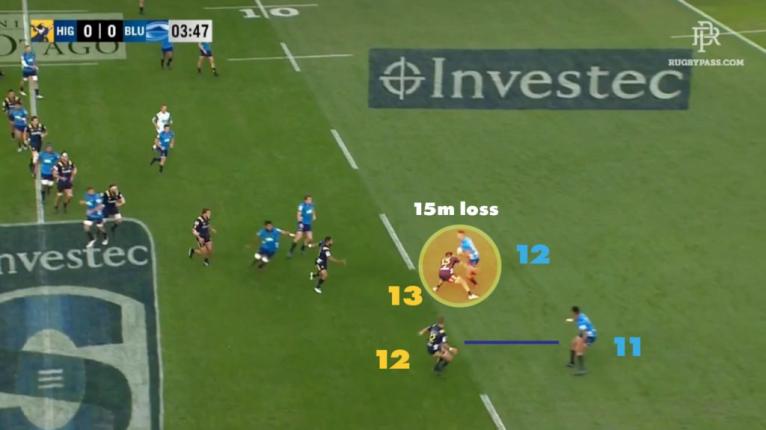
Sonny Bill Williams is almost stationary when he receives the ball meaning Rieko Ioane outside of him also has to stop. If Williams offloads, Ioane would be standing still with Walden (12) closing in.
Again, we see Gatland passing deep to Collins far behind the gain line and the decoy runners nowhere near the advancing defensive line as viable options.
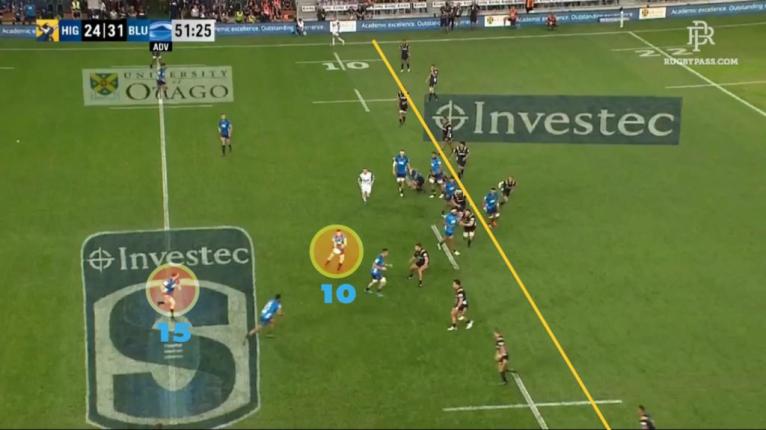
Once Matt Duffy (14) receives the ball he is monstered by Tevita Li (11) for another big loss.
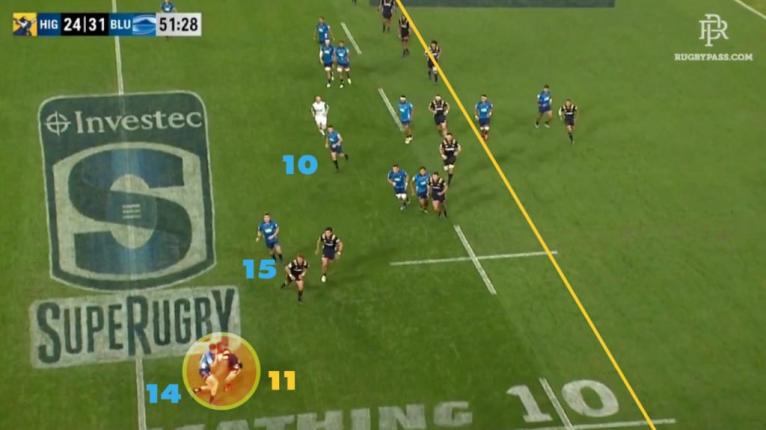
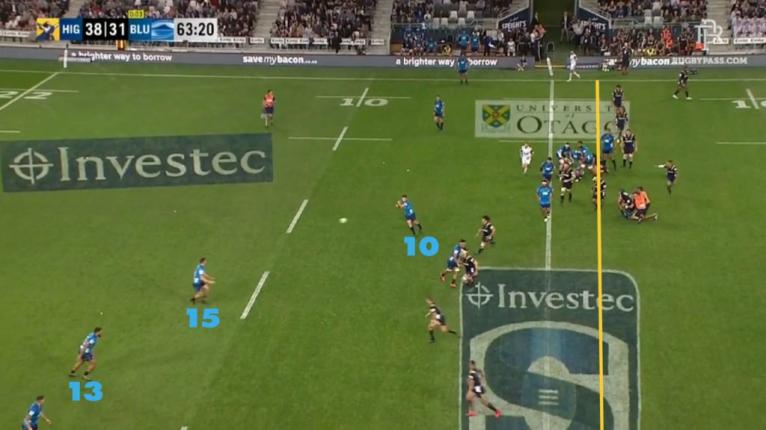
Here again, none of the backs have moved off their mark and Gatland has already released his pass.
The next man is under so much pressure by the time he receives it he has to fling it on awkwardly. George Moala and Sonny Bill Williams are standing still outside him, with zero momentum.
The clunky pass is fired above Williams’ head and Tevita Li is easily able to cover the overlap.
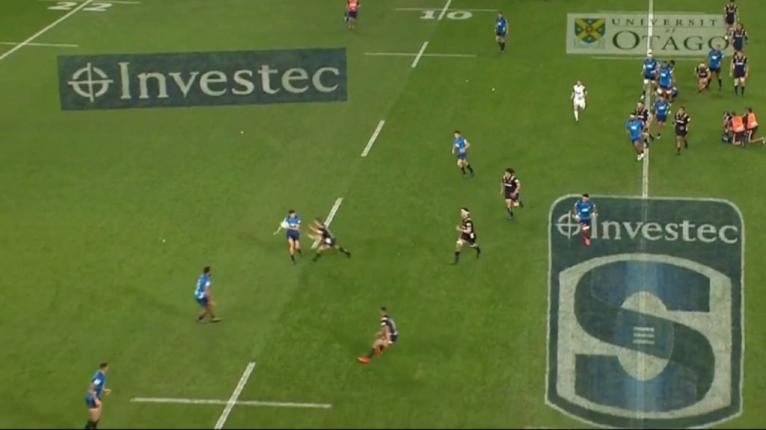
We have seen in recent years when sides try to play with a ‘game managing’ 10, they fall back into this type of deep structure, which only results in disaster.
The Reds with Jake McIntyre tried the same thing and were cannon fodder for teams with rapid line speed. You cannot stand still and shovel wide to your weapons.
The Blues are looking to employ similar tactics but will find it extremely difficult against all the New Zealand sides that all adopt vicious rush tactics. Even if they are able to successfully spread the ball to Ioane, he will often be static and 15 metres behind the gain line.
Gatland was far more promising in the first half when he attacked the line and played on the run instead of the ‘stand and shovel’ pass that developed as the game went on.
The Blues deep attack is usually limited to when they try to release the open side. Their short side is generally much flatter, and this is where they found success on numerous occasions against the Highlanders.
Ioane might be world’s best wing, but is Moala a better centre?
George Moala is a run-dominant player – which is a nicer way of saying he doesn’t pass the ball often.
There is a reason why Moala is no longer in contention for the All Blacks. Younger more rounded centres like Jack Goodhue have surpassed him. He is obviously capable of passing the ball as seen in the try above, but often misses opportunities to utilise space on the outside when he is covered, favouring contact instead.
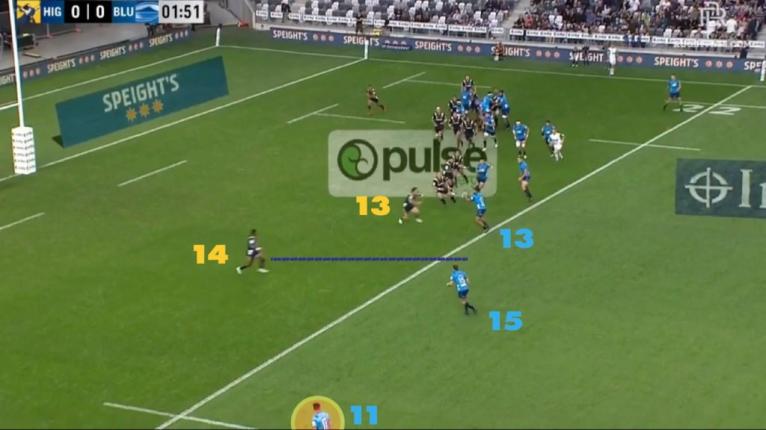
The Blues have a lineout play inside the Highlanders 22 early in the match and Moala finds himself pressured by Rob Thompson as he receives the ball. With two men outside him, quick hands by Moala could release Ioane for a try scoring opportunity.
Waisake Naholo (14) is trying to close the outside space but is angling in. If Moala can get the ball to Collins, he will already be outside of Naholo giving the Blues a massive scoring opportunity.
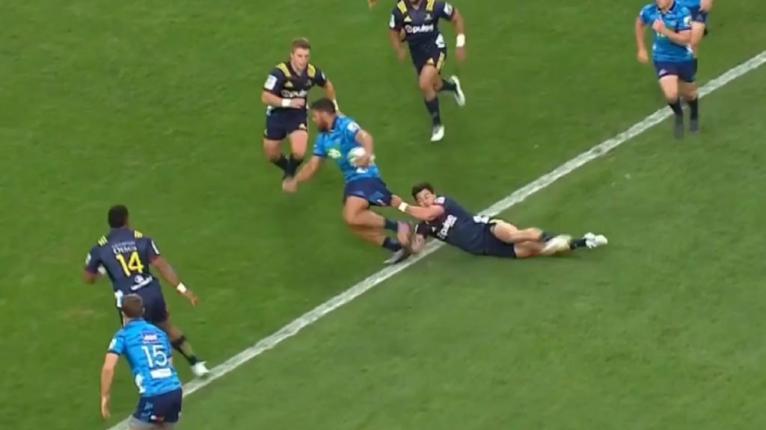
Moala tries to take on Thompson on the outside and is swallowed by the Highlanders cover defence.
Again right before halftime, Moala has an opportunity down the short side to play numbers and free up Ioane inside the 22.
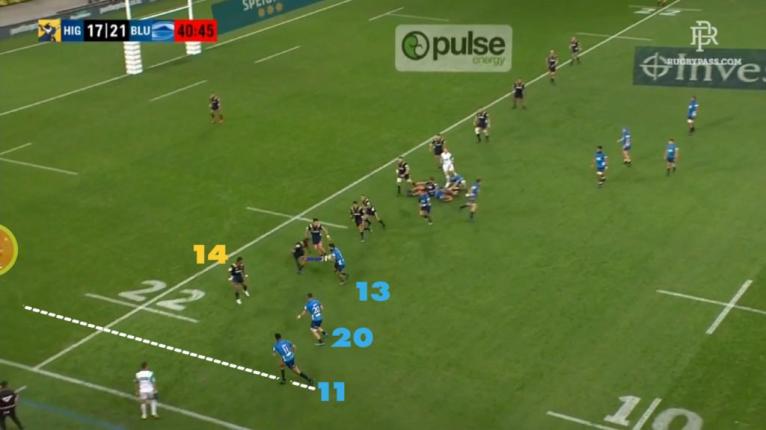
He engages his opposite forcing Naholo to cover two players. All that is required is a simple pass and the next man can free Ioane.
He takes it into contact and the opportunity is lost.
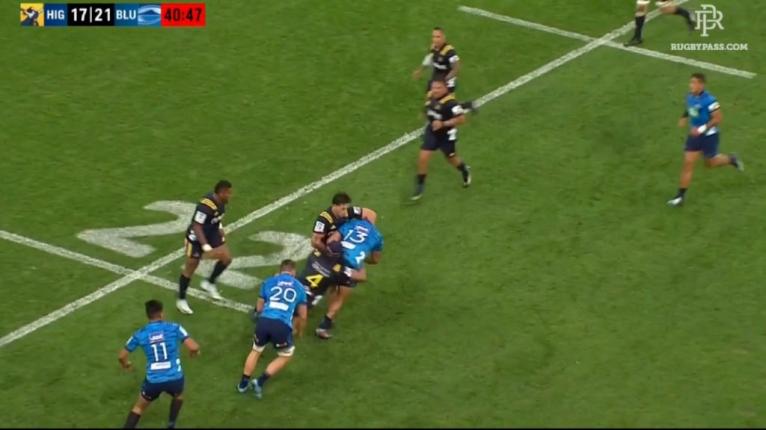
Without a ball-playing 13, Ioane is going to have limited opportunities on the end of the Blues backline. When you have the deadliest player on the field and don’t use him enough, the missed opportunities add up in a game only decided by 7 points.
The one set-piece play Ioane was used on was a simple crash ball running off 9. There was no creative play design to use Ioane in wider channels. This stunning play by the All Blacks created space for him outside the centre channel and he took advantage.
The All Blacks create space for Ioane, the Blues don’t.
The case for 13
The reasoning above argues that Ioane will be wasted on the wing this year but doesn’t outline the benefits the Blues will get from actually having Ioane at centre. Without going into too much detail, these are fairly obvious.
He will have the opportunity to get more touches on both sides of the field. We saw Ioane’s freakish offload in the lead up to Matt Duffie’s try on the right-hand side of the field. There is no reason why he couldn’t provide more of that in the 13 jersey.
He has the ball-skills Moala doesn’t, plus the speed and breakaway ability. He will draw in more attention from defenders but has the ability to capitalise on it – by getting away offloads in the tackle. George Moala would actually benefit more being outside Ioane.
The Blues have depth issues in attack, but having the dangerous Ioane there could still work. Even under pressure, he will be a better chance at shaking off the first defender and opening something up.
The move will benefit both Ioane and Moala, and ultimately the Blues. They must do what is best for them.
Ioane is the world’s best wing because he is in the world’s best team – the All Blacks.
The Blues aren’t, they need him at 13.







































































